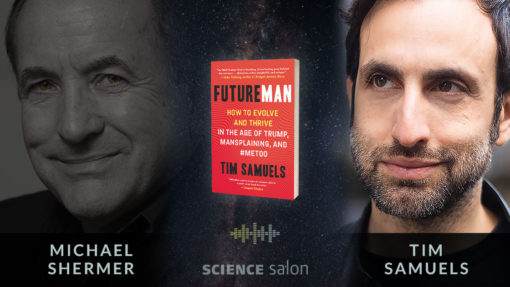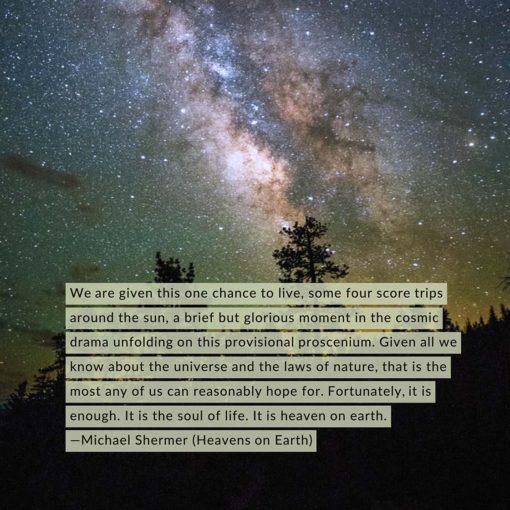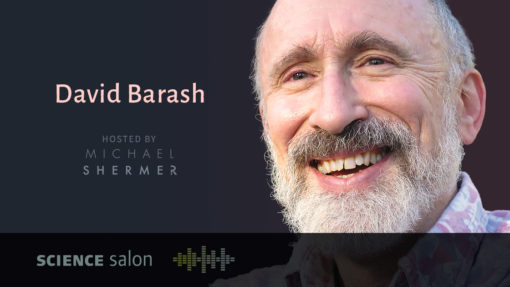In this, the final lecture of his Chapman University Skepticism 101 course, Dr. Michael Shermer pulls back to take a bigger picture look at what science and reason have done for humanity in the realm of moral progress. Watch The Moral Arc: How Thinking Like a Scientist Makes the World More Moral.
Tags
-
browse by topic
violence
eSkeptic for July 3, 2020
Travels Within the Feminist Divide
In this column social psychologist Carol Tavris discusses two new books whose authors separate what’s right in the pursuit of justice from what’s self-righteous. As skeptics, they repudiate received wisdom and party loyalty, showing that by separating what we wish for from wishful thinking, we can find better, more creative, more flexible routes to attaining the former.
eSkeptic for June 2, 2020
In Science Salon # 118 Michael Shermer speaks with distinguished artificial intelligence researcher Stuart Russell about this new book Human Compatible: Artificial Intelligence and the Problem of Control. PLUS social psychologist Carol Tavris discusses two new books whose authors separate what’s right in the pursuit of justice from what’s self-righteous.
The Crooked Timber of Auschwitz: A brief history of how a concentration camp became an extermination center

On the 75th anniversary of the liberation of the Auschwitz death camp, Michael Shermer and Alex Grobman present a brief history of how a concentration camp became an extermination center.
eSkeptic for January 26, 2020
On the 75th anniversary of the liberation of the Auschwitz death camp, Michael Shermer and Alex Grobman present a brief history of how a concentration camp became an extermination center.
Tim Samuels — Future Man: How to Evolve and Thrive in the Age of Trump, Mansplaining, and #MeToo

If ever there was an urgent need for a frank understanding of what’s going on with men, it is now. Male rage and frustration have driven resurgent populism, mass shootings, and epidemics of addiction and violence. Powerful men who have abused their positions for decades have been and are being #MeToo-outed and dismissed. The patriarchy, that solid bedrock of male power for thousands of years, seems to be crumbling…
eSkeptic for November 19, 2019
In Science Salon # 92 Michael Shermer speaks with Tim Samuels about his brand new book: Future Man: How to Evolve and Thrive in the Age of Trump, Mansplaining, and #MeToo. PLUS: Michael Shermer reviews The Violence Paradox, a PBS NOVA film special based on Steven Pinker’s book The Better Angels of Our Nature.
The Enemy Within: a Review of “The Violence Paradox”

Michael Shermer reviews The Violence Paradox, a upcoming two-hour PBS NOVA film special, a production of WGBH Boston, November 20, 2019.
eSkeptic for April 10, 2019
In this fascinating dialogue, Dr. Michael Shermer speaks with biological anthropologist Dr. Richard Wrangham about the evolutionary histories of reactive and proactive aggression as theorized in his book The Goodness Paradox: The Strange Relationship Between Virtue and Violence in Human Evolution.
Dr. Richard Wrangham — The Goodness Paradox: The Strange Relationship Between Virtue and Violence in Human Evolution

Richard Wrangham offers a startlingly original theory of how, in the last 250 million years, humankind became an increasingly peaceful species in daily interactions even as its capacity for coolly planned and devastating violence remains undiminished. In tracing the evolutionary histories of reactive and proactive aggression, biological anthropologist Richard Wrangham forcefully and persuasively argues for the necessity of social tolerance and the control of savage divisiveness still haunting us today.
eSkeptic for January 9, 2019
In this article from Skeptic magazine 23.1 (2018) Ken Levy examines arguments put forth by theists that God’s existence is perfectly compatible with all the violence, pain, suffering, and premature death we experience.
God, Heaven, and Evil: A Renewed Defense of Atheism

In this article from Skeptic magazine 23.1 (2018) Ken Levy examines arguments put forth by theists that God’s existence is perfectly compatible with all the violence, pain, suffering, and premature death we experience.
eSkeptic for November 7, 2018
Humans have long seen ourselves as the center of the universe. This viewpoint — a persistent paradigm of our own unique self-importance — is as dangerous as it is false. In this Science Salon with Michael Shermer based on his new book Through a Glass Brightly noted biologist and evolutionary psychologist David Barash explores the process by which science has, throughout time, cut humanity “down to size,” and how humanity has responded.
Dr. David P. Barash — Human Nature Through a Glass Brightly

Humans have long seen ourselves as the center of the universe. This viewpoint — a persistent paradigm of our own unique self-importance — is as dangerous as it is false. In this Science Salon with Michael Shermer based on his new book Through a Glass Brightly noted biologist and evolutionary psychologist David Barash explores the process by which science has, throughout time, cut humanity “down to size,” and how humanity has responded.
eSkeptic for May 30, 2018
Listen to Science Salon # 25: a remarkable conversation between Michael Shermer and Pulitzer Prize- and National Book Award-winning author Richard Rhodes as they discuss nuclear weapons, North Korea, Iran, and Russia, the psychology of Mutual Assured Destruction (MAD), human violence and its causes, the socialization of violence, and his new book Energy: A Human History.
Richard Rhodes — Energy: A Human History

Shermer speaks with Pulitzer Prize-winning author Richard Rhodes about: nuclear weapons, North Korea, Iran, and Russia, the psychology of Mutual Assured Destruction (MAD), human violence and its causes, the “Bullet Holocaust” (the millions of Jews and others shot to death in Eastern Europe before the death camps ramped up their killing by gas), how people become serial killers (the socialization of violence), and the fascinating history behind energy transitions over time.
eSkeptic for February 7, 2018

Do “violent” video games pose “as big a health risk as alcohol and drug abuse” and are they “ruining the youth of America”? In this week’s eSkeptic, Terence Hines reviews Moral Combat: Why the War on Violent Video Games Is Wrong, by Patrick M. Markey and Christopher J. Ferguson.
Virtual Violence

Do “violent” video games pose “as big a health risk as alcohol and drug abuse” and are they “ruining the youth of America”? Terence Hines reviews Moral Combat: Why the War on Violent Video Games Is Wrong, by Patrick M. Markey and Christopher J. Ferguson.
eSkeptic for December 13, 2017
In this week’s eSkeptic, Raymond Barglow discusses how the psychoanalytic tradition inaugurated by Sigmund Freud casts light on the mainsprings of human motivation and helps to explain human irrationality and encourage recovery.
Dr. Walter Scheidel — The Great Leveler: Violence and the History of Inequality from the Stone Age to the 21st Century

Are mass violence and catastrophes the only forces that can seriously decrease economic inequality? To judge by thousands of years of history, the answer is yes. Tracing the global history of inequality from the Stone Age to today, the Stanford University historian Walter Scheidel shows that inequality never dies peacefully. Inequality declines when carnage and disaster strike and increases when peace and stability return.
SKEPTIC App
Whether at home or on the go, the SKEPTIC App is the easiest way to read your favorite articles. Within the app, users can purchase the current issue and back issues. Download the app today and get a 30-day free trial subscription.










